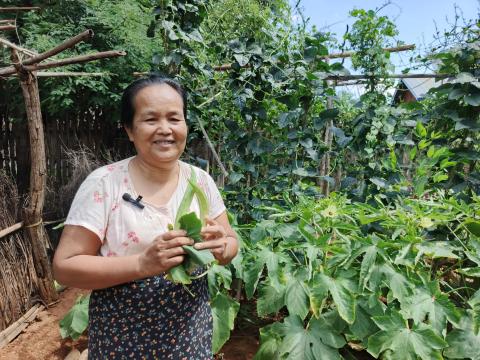Thidar’s home garden: A model of sustainable indigenous agriculture

Thidar 54-year-old women living with her husband and two daughters in a small village of Yenanchaung Township. Thidar husband works as a traditional musician but it was not enough to support the family. Therefore, Thidar and her husband had to work as a casual laborer.
World Vision implemented its Area Programme in Yaynanchaung Township in 2008. As soon as, the Area Proggramme started in Thidar’s village, she was selected as a member of the Community Based Organisations (CBO). Since then, she has served her community as a member of CBO. Thidar shared, “I’m interested in community development work and actively participate in village affairs. I have been involved with the Village Savings and Loan Association (VSLA), also known as Saving for Transformation (S4T). Our village has collaborated with a Community-Based Organization (CBO) grant project from 2008 to 2012. Through this CBO project, I participated in training for Home Gardening, VSLA, and Mother and Child Health care. I not only shared this knowledge with other communities but also initiated a small-scale Home Gardening farm with the project’s support.”
She shared the knowledge she received from the training, but also applied her knowledge by starting up the small-scale home garden. She plants various seasonal vegetables to generate income and family consumption. She mainly grows Citrus, Bottle gourd, Pumpkin, Bitter gourd, Roselle, Lady’s finger, Tomato, Asparagus bean, Banana, Ribbed luffa, etc. Some of the vegetables are grown primarily for sale, providing an income opportunity, while others are for family consumption or to support other vulnerable families. With vegetable farming as a source of income, the annual earnings amount to approximately 100,000 Myanmar Kyats (MMK) from two cultivation cycles.
She also mentioned her challenges, “A daily task is required to fetch water from available sources, like natural ponds, especially when the village’s water supply is inadequate for farming needs. Consequently, the total monthly water expense for the farm amounts to 1,000 MMK (annually 12,000 MMK). Moreover, indigenous vegetable seeds are scarce.”
The total income from vegetable sales has reached 550,000 Myanmar Kyats (MMK) from 2016 to August 2024. The benefits include providing her family with fresh and nutritious vegetables, supporting her daughter’s education, purchasing meat for consumption, sharing technical knowledge with others, and donating vegetables to vulnerable families and improved health due to organic farm produce.
Thidar intend to expand the vegetable farm area and also plan to start cultivating indigenous vegetable seedlings for sale. This will provide communities with the opportunity to grow fresh vegetables and create an additional source of income.
Thidar shared her gratitude, “I would like to express my heartfelt gratitude to everyone and World Vision Myanmar Yenanchaung Area programme. Thanks to this programme, my family now enjoys better food security and additional income from our sustainable indigenous vegetable farm. Moreover, the community has become more knowledgeable about vegetable farming practices.”
The Yenanchaung Area Programme was initiated in January 2007. It has impacted a population of 26,732, which includes 2,191 boys and 2,732 girls. The programme has been implemented with technical initiatives in health, nutrition, WASH (Water, Sanitation, and Hygiene), child protection, and livelihood resilience, all aimed at improving Child Well-being outcomes for the most vulnerable families.
The Resilience and Livelihoods Technical Programme has greatly enhanced the lives of the community and children in the target area. It has done so through a variety of models and initiatives, including the Ultra Poor Graduation model, the Building Secure Livelihoods (BSL) Model, the Savings for Transformation (S4T) Model, and the Local Value Chain Development (LVCD). These initiatives have been instrumental in building community capacity, forming business groups, and providing vital technical support and resources for agriculture and livestock. Additionally, these programmes have been integrated with other technical programmes to amplify their impact.